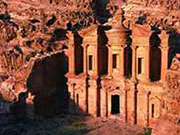Heritage site hurt by regional crisis and erosion

 0 Comment(s)
0 Comment(s) Print
Print E-mail CNTV, July 27, 2015
E-mail CNTV, July 27, 2015
Chinese silk, Indian spices, Arabian incense. In ancient times, they all passed through the Nabataean city of Petra, a trade route for Egypt, Arabia and Syria-Phoenicia. Petra was named a UNESCO World Heritage site in 1985, but Jordan's national treasure is eroding.
 |
|
Heritage site hurt by regional crisis and erosion |
Carved out of sandstone rock by Nabataean nomads in 400 BC, this was a bustling caravan trade route for almost a thousand years.
Today, the World Heritage sites' tombs and temples are slowly crumbling. The result of a combination of wind, rain, sun and tourists.
"This is a prime example of erosion. Up until 2003, tourists could go inside of the treasury. Not anymore. Thousands upon thousands coming and going throughout the years were destroying the steps leading into the treasury," CCTV reporter Stephanie Freid said.
Jordan's Preservation Society has instituted standards for archeologists working at the site. Flash floods are strategically diverted, and tourists are barred from fragile areas.
But ironically, while tourists do the most damage to Petra simply by hiking and climbing through it, tourism dollars, Euros and Yuan pay for its restoration.
With parts of the Mideast in turmoil, tourism took a hit. In 2010, Petra hosted nearly a million visitors. Last year, only a quarter of that number visited the site a 50 million dollar loss.
"Jordan is located on the middle - between Egypt, Syria, Libya foreign people thought that the situation is not safe here in Jordan," said Tahani Al-Salhi, site engineer, Petra.
The ones who do come are considered brave by peers.
"Their friends say to them: 'Are you crazy to come there It's very dangerous.' Everybody think it's dangerous here so it's like war. Many people think Middle East is one country," said Khaled, Vendor.
The tourists we encountered either live in neighboring countries or work in the Middle East. They are familiar with the geo-political situation.
"I'm usually traveling with groups of Jordanians or others when I visit these sites. And I don't see too many Westerners," said Eric, tourist.
Petra's regional authority routinely implements tourist management plans but without visitors, there are no funds for strategies and few ways to provide protection.






Go to Forum >>0 Comment(s)